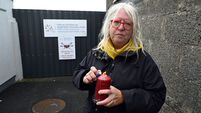Sarsfield Road - A financial roundabout?

A report into one of the largest local authorities in the country has revealed significant concern with how it is managing its finances.
The Local Government Audit Service said there were weaknesses across a range of areas within Cork City Council.
In a confidential commentary to the departing city manager, Tim Lucey, the spending watchdog for local authorities said an effort to get its house in order had not achieved its goal.
The auditor said changes had been made but the council was burdened with a heavy pile of debt and legacy issues with housing loans.
In February, Mr Lucey said he was leaving to become Cork county manager, where he worked before moving to City Hall in 2010. He finishes this week. Recruitment for his replacement began last Friday.
Regardless of who gets that job, the recent assessment by local government auditor Eamonn Daly has set out the nature of the challenge.
According to the auditor’s review, the successful applicant will need to find ways to reduce the authority’s borrowings and to improve its business practices.
During Mr Lucey’s term, the council invested in internal audits to examine shortcomings. It acted on some recommendations, but other gaps were not addressed.
In a statement, Mr Lucey said that, despite fewer staff and tighter budgets, he had improved controls while protecting service levels.
Some of this was praised by the auditor. Mr Daly said the council had improved its procurement practices following issues with how it was awarding maintenance contracts and road repair work.
These provoked concern during the review of 2011 when it emerged €3.5m had been paid to a vehicle rental company without any proper tender process. Another €2.5m had been spent on housing repairs without complying with the rules.
However, while these holes were plugged, the latest report found systemic flaws. It criticised the “poor response” to failings.
In a statement Mr Lucey said the auditor’s report should be viewed against a period when the council was working hard to balance its books.
“I have placed a considerable emphasis on resourcing and enhancing the control environment due to the particular circumstances that presented on my appointment as manager and that were to evolve from the continuing worsening economic climate over my own period of office in the city,” said Mr Lucey.
“The organisation has successfully operated with financial stability being achieved annually despite the massive shocks to the system which had to be endured.”
The critical letter Mr Daly sent to Mr Lucey was part of the normal audit cycle.
It was not the information circulated to people who live and run businesses in the city or who are tenants of the authority. Together, these people cover two thirds of the €160m budget.
The public is entitled to see the statutory audit which has been published on the council’s accounts for 2012. But people are not privy to the management letter which lands the same day.
In November, the management letter for Cork City said that, in the view of the local government auditor, not enough was being done.
“I wish to state that I have concerns at the poor response to the significant internal control weaknesses across many areas of the council as identified within a number of recent reports, including my own,” Mr Daly said.
“I again recommend that they be discussed with your senior management team as a matter of urgency to enable appropriate action plans to be formulated and implemented without further delay.”
Mr Daly’s 11-page report detailed 20 areas of concern. He noted that this was not exhaustive. “The issues raised should not be regarded as a comprehensive statement of all weaknesses that exist or of all improvements that might be made,” said Mr Daly.
His points are all the more worrying because of the size of the organisation.
In 2011, Cork City Council’s total expenditure stood at €250m. Of this, €64m was spent on capital projects. The majority of its income was local money.
A third of its revenue came from rates. And another third came from selling goods and services — a category dominated by local authority rents, parking fines, and commercial water charges.
In his statement, Mr Lucey stressed that, notwithstanding the auditor’s concerns, the council had been coping. “From a financial perspective, the council has again reported in its 2013 annual financial statement a revenue account surplus ... reflecting a high-performing budgetary control environment,” he said.
Broadly, the auditor’s concerns fell into two categories.
The first documented individual incidents where waste occurred or there is a potential loss to the council.
Some of these were legacy issues with debts overhanging from housing purchases.
Others were recent problems such as the €11m overrun on the Sarsfield Rd flyover.
However, secondly, there were more fundamental concerns on internal structures and responses to criticisms.
Alarm was raised at the attitude of the various departments in City Hall to audit reports; the skills available to implement recommendations; and the effort to enforce this among the frontline spending departments.
The city manager said that he worked to ensure resources are maintained in the audit division despite staff cuts.
“Over the past four years, the significant enhancement of resource assignment and activity of the council’s own internal audit section, the appointment of additional finance managers to high-spend directorates, and the introduction of council’s own business process improvement unit reflects a specific response to enhance the management and reporting of risks that can arise in organisations that have had to go through such highly disruptive downsizing and restructuring,” said Mr Lucey.
Mr Daly said the resulting audit reports are not having the impact they should. He said the reports were late in being issued, partly because of the difficulty in getting replies from managers.
Of 42 audit reports in recent years, eight were published without a response from the manager concerned. Similarly the city council hired an external adviser to assess its business during 2012.
The accountants looked at where the authority was getting its money — housing loans, housing rents, and parking. This report “identified significant weaknesses in the internal control environment in respect of the areas examined including the inadequacy of the documented procedures currently in place”.
Mr Daly said that, despite this, there were problems in making sure the lessons were circulated to those who needed to implement them.
When contacted by the local government auditor, some of the managers were unaware of the recommendations of the external advisors.
In previous audits, a gap was spotted in the ability of the management structure to deal with the financial work. This was addressed by Mr Lucey, but the auditor said the fix was not working properly.
“I wish to reiterate that the lack of a clearly defined role for this important position [finance manager] adversely impacts on the improvements in financial reporting that could otherwise be achieved,” said Mr Daly.
“There remains a lack of agreement and clarity in respect of what is both expected and required from these positions.”
The city council has been seeking to resolve this. Mr Lucey said it was a work in progress.
“Implementation of continued improvement, however, does take time when resource assignment by directorate and line managers must be delicately balanced to achieve progress on many fronts,” he said.
Still, the auditor found evidence that, even with some changes at the top, bad habits were continuing.
A lot of emphasis has been placed on the work of the city’s internal auditors.
The council said it protected this section. The national watchdog said the work had not been taken onboard.
A particular case centred on a report in May 2011 into the practice of approving purchases after, or just as, deals were done.
According to the management letter, 73% of purchase orders in 2012, accounting for €45m of spending, were non-compliant with proper procedures. Most purchase orders were approved on the same day as the transaction or after it.
This was despite the May 2011 work by the internal auditors on this bad habit.
More than two years later, in August 2013, 64% of all purchase orders were approved on the same day or after a sale deal was made.
Likewise, Mr Daly’s latest criticisms on a lack of response to internal auditors had echoes of his unit’s commentary from a year earlier.
In late 2012, the audit on Cork City referred to a 2010 commitment by senior managers to review the status of recommendations made in audit reports published between 2007 and 2010. In 2012, the review had still not been completed.
Mr Lucey issued a detailed response to the problems highlighted by the auditor.
He said Mr Daly’s letter was not written as a public document so there was context that had not been discussed.
Mr Lucey said some of the matters raised had already been addressed, while the letter reflected the difficulty of managing the risks while working with 341 less staff.
He said reforming under these circumstances caused obvious headaches.
“The competing demands of delivering services and re-organising, reshaping and improving operational systems and efficiency places considerable stress on any organisation,” said Mr Lucey.
“The fact that no audit of the city council has ever been qualified by an auditor, and that many of the matters raised in the audit management letter are not matters which ever impacted negatively on formal audit opinions, puts the matters raised into perspective.”
Mr Lucey also said there were financial problems rooted in decisions made during the boom that will not be sorted out locally.
“It is of course a fact that the council does have a number of underlying structural debt difficulties that can only be completely eliminated with central government assistance,” he said.












